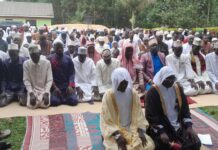By Flavia Ajok
Conservationists across Africa say they face a lot of criticism and resistance as they engage in activities that seek to protect and maintain sacred natural sites by the born-again churches.
David Kureeba, Officer of Forests and Biodiversity at National Association of Professional Environmentalists- NAPE says the protection of native sacred sites is vital to maintaining and passing from generation to generation the distinct identities, traditions, and histories of communities.
He however says, many born-again churches and believers are terming the sacred sites as satanic forgetting about their heritage.
Kureeba has also accused land grabbers of contributing greatly to the extinction of sacred sites.
Anne Maina, the national coordinator Biodiversity and Biosafety Association Kenya says evangelism has made their work so hard in protecting the sacred natural sites.
Maina says the use and protection of sacred sites is not merely a cultural or spiritual concern but a human right that has been identified and protected by international law. Article 25 of the UN Declaration on the Rights of Indigenous Peoples provides that: “Indigenous peoples have the right to maintain and strengthen their distinctive spiritual relationship with their traditionally owned or otherwise occupied and used lands, territories, waters and coastal seas and other resources and to uphold their responsibilities to future generations in this regard.”
She also calls for the engagement of all the stakeholders in the conservation of the sacred sites.
Fassil Gebeyehu Yelemtu, the Fassil Gebeyehu Yelemtu, the general coordinator African Biodiversity Network says the problems of African countries are all the same when it comes to the role of recognition of indigenous communities.
Ivan Amanigaruhanga, from African Biodiversity Network- ABN reveals that according to World Bank report 2021, 41 percent of the land in Uganda has been degraded and that by 2040 if nothing is done to stop wetland encroachment the country will only be left with 1.6 percent of wetland coverage.
Amani adds that the crested cranes are at the verge of extinction due to wetland degradation because they lay their eggs in the wetlands
The connection between religion, nature and conservation has become a prominent topic among scholars and conservation practitioners. Numerous studies have shown that spiritual beliefs have contributed to preserving important biodiversity in sacred areas around the world.
The CSO members made the remarks during a meeting aimed at popularising the African Commission on Human and People’s Rights organised by African Institute for Culture and Ecology in conjunction with Africa Biodiversity Network held at Miika Resort Hotel in Hoima City ion Thursday.




